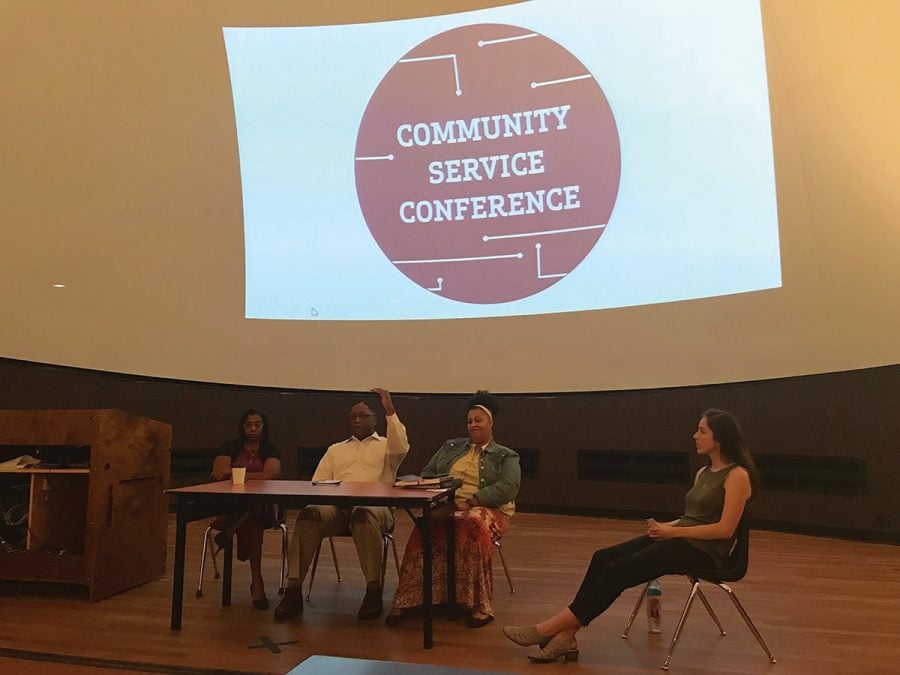Community shares service experiences
The first set of panelists from the Community Service Conference shares their experiences on service and encourages students to get more involved. // Photo By: Ethan Santana/The Guilfordian
For the past 20 years at Guilford the Bonner Scholars, have dedicated thousands of hours toward serving their local communities and addressing issues such as refugee support, environmental sustainability and food security.
On Saturday, Oct. 6, the Bonner Center hosted a Community Service Conference in the Frank Family Science Center to encourage the Guilford community, including students, to become involved with service. The event consisted of two panels, a keynote, a faculty workshop and two presentations on community-based research projects, all of which were open anyone interested.
“The Community Service Conference was all about giving members of the Guilford community the opportunity to learn about some of the social justice issues faced by the Greensboro community from community members, leaders, and organizers,” said Bonner Scholars Coordinator Audrey Mangili.
As an introduction, Bonner Scholars junior Maya Moore and junior Mohamed Togol shared their experiences with community service, emphasizing the personal connections they formed.
“When I came to Guilford as a freshman, I didn’t pick up litter and I didn’t do much gardening,” said Moore. “I came here and the first thing I was doing was helping out at veterans at local shelters. I learned a lot about homelessness and about their lives.”
To cover a broad range of community issues, participants attended either a student-community or faculty workshop.
Mangili hosted the community-based workshop, which consisted of a panel entitled “Community and Economic Development,” discussing various problems faced by minority groups in Greensboro, specifically in the eastside.
Panelists Phil Barnhill, Josie Williams and Nicole Spiree shared their knowledge and contributions to minority communities. One of the prevalent issues touched on was the transportation system in Greensboro.
“One of the biggest barriers when we are talking about the infrastructure, is the low economic mobility in that area, when people are trying to get to their doctors’ appointments, when people are trying to get to their job,” said Williams. “Whereas for me, I can get there in five minutes, it takes them two hours.”
At the same time, Director of the Bonner Center James Shields and Engaged Teaching Specialist and Program Coordinator Sonalini Sapra led the faculty workshop which focused on creating partnerships within the community.
While many students attended the workshop, not many faculty members made an appearance.
“There was not a lot of faculty,” said junior Berenice Fuentes-Juarez. “There were more students than faculty to be honest, but we reflected on relationships between community partnerships and the school. I wish more faculty attended because they need to know about these important topics about service.”
The next scheduled event consisted of presentations by faculty members who dedicated classrooms to directly engaging students in service. Jemima Adisa ‘18 and Associate Professor of Biology Michele Malotky presented a 250-level course based in the biology classroom.
“What we did in this class is made it a course-based research experience focused on health disparities in immigrant, refugee and underrepresented communities,” said Malotky. “We want to draw more students into recognizing that science can be a really fun and cool thing that does directly involve communities and can help with real-world problems.
Professor of Justice and Policy Studies Krista Craven, Professor of Peace and Conflict Studies Zulfiya Tursunova, Associate Professor of History Zhihong Chen and Sapra led the second presentation on their project with the Homeless Union of Greensboro. Each professor had students play a role in their pilot study, consisting of 100 surveys from homeless individuals. Students worked on either interviewing, researching or analyzing data to create public reports and individual focus groups.
“We want to work in partnership with community members to develop a plan around issues that they feel are important to investigate further,” said Craven.
Following a lunch at the cafeteria, Sapra hosted a panel entitled, “Hunger and Homelessness” to address the root causes of homeless in Greensboro and offer ways in which the community can help. Panelists Liz Seymour, Deloris Williams, Marcus Hyde and Dawn Freeman discussed the difficulties associated with poverty and its limits which prompt action.
“If we’re actually committed to doing something about poverty, we have to do some critical introspection as people who are helping others, to see where we are getting in the way, where the work that we are doing is stopping more meaningful change from happening,” said Hyde. “Unless you change the power dynamic in society, we will continue to have homelessness.”
As the event drew to a close, conference organizers expressed hopes for attendees to continue conversation about community issues and encourage others to become involved in service.
“To have a real impact, we really need to take a lesson from community organizers and make the commitment to organize and educate ourselves,” said Mangili. “If you don’t know why or ask why people are living in continuous poverty, sleeping outside in makeshift tents or sending their kids to school hungry, if you don’t know why East Greensboro looks the way it does, you shouldn’t be doing any kind of service or volunteering or sending students out to do service.”









